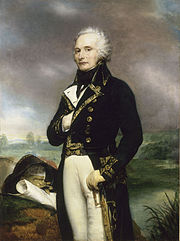| Alexandre de Beauharnais | |
|---|---|

| |
| Alexandre de Beauharnais | |
| Personal details | |
| Born | 28 May 1760 Fort-de-France |
| Died | 23 July 1794 (aged 34) Place de la Révolution, Paris |
| Spouse(s) | Joséphine Tascher de la Pagerie |

Alexandre de Beauharnais
Alexandre François Marie de Beauharnais, Vicomte de Beauharnais (28 May 1760 – 23 July 1794) was a French political figure and general during the French Revolution. He was the first husband of Joséphine Tascher de la Pagerie, who later married Napoleon Bonaparte and became Empress of the First Empire.
Alexandre was arrested in March 1794, and following his sentence of death during the Reign of Terror, was executed by guillotine in Paris's Place de la Révolution.
Ancestry[]
His paternal grandparents Claude de Beauharnais (1680–1738) and Renée Hardouineau (1696–1744) were married in La Rochelle during 1713. His father François de Beauharnais, Marquess de la La Ferté-Beauharnais (1714–1800) served as Governor of Martinique. Alexandre was the third of three sons born to him by his first wife Marie Henriette Pyvart de Chastullé (1722–1767) - the first died in infancy, and the second was Francis VI of Beauharnais. His father was remarried in 1796 to Eugenie de Tascher de la Pagerie (1739–1803).
Biography[]
Alexandre was born in Fort-Royal (today's Fort-de-France), Martinique. On 13 December 1779 in Paris, France, he married Joséphine Tascher de la Pagerie, the future Empress of France. They had two children:
- Eugène de Beauharnais (3 September 1781 – 21 February 1824).
- Hortense de Beauharnais (10 April 1783 – 5 October 1837), later mother of Napoleon III of France.
Alexandre fought in Louis XVI's army in the American Revolutionary War. He was later deputy of the noblesse in the Estates-General, and was president of the National Constituent Assembly from 19 June to 3 July 1791 and from 31 July to 14 August 1791. Made a general in 1792 (during the French Revolutionary Wars), he refused, in June 1793, to become Minister of War. He was named General-in-Chief of the Army of the Rhine in 1793.
On 2 March 1794, the Committee of General Security ordered his arrest. Accused of having poorly defended Mainz during the Siege of Mainz in 1793, and considered an aristocratic "suspect", he was jailed in the Carmes prison and sentenced to death during the Reign of Terror. His wife, Josephine de Beauharnais, was jailed in the same prison on 21 April 1794, but she was freed after three months, thanks to the trial of Maximilien Robespierre.
Alexandre was guillotined, together with his cousin Augustin, on the Place de la Révolution (today's Place de la Concorde) in Paris, only five days before the deposition and execution of Robespierre.
Through his son, he became an ancestor of today's Royal Houses of Belgium, Denmark, Norway and Sweden, as well as the Grand Ducal House of Luxembourg.
Ancestry[]
| Ancestors of Alexandre de Beauharnais | ||||||||||||||||||||||||||||||||||||||||||||||||||||||||||||||||||||||||||||||||||||||||||||||||||||||||||||||||||||||||||||||||||||||||||||||||||||||||||||||||||||||||||||||||||||||||||||||||||||||||||||||||||||||||||||||||||||||||||||||||||||||||||||||||||||||||||||||||||||||||||||||||||||||||||||||||||||||||||||||||||||||||||||||||||||||||||||||||||||||||||||||||||||||||||||||||||||||||||||||||||||||||||||||||||||||||||||||||||||||||||||||||||||||||||||||||||||||||||||||||||||||||||||||||||||||||||||||||||
|---|---|---|---|---|---|---|---|---|---|---|---|---|---|---|---|---|---|---|---|---|---|---|---|---|---|---|---|---|---|---|---|---|---|---|---|---|---|---|---|---|---|---|---|---|---|---|---|---|---|---|---|---|---|---|---|---|---|---|---|---|---|---|---|---|---|---|---|---|---|---|---|---|---|---|---|---|---|---|---|---|---|---|---|---|---|---|---|---|---|---|---|---|---|---|---|---|---|---|---|---|---|---|---|---|---|---|---|---|---|---|---|---|---|---|---|---|---|---|---|---|---|---|---|---|---|---|---|---|---|---|---|---|---|---|---|---|---|---|---|---|---|---|---|---|---|---|---|---|---|---|---|---|---|---|---|---|---|---|---|---|---|---|---|---|---|---|---|---|---|---|---|---|---|---|---|---|---|---|---|---|---|---|---|---|---|---|---|---|---|---|---|---|---|---|---|---|---|---|---|---|---|---|---|---|---|---|---|---|---|---|---|---|---|---|---|---|---|---|---|---|---|---|---|---|---|---|---|---|---|---|---|---|---|---|---|---|---|---|---|---|---|---|---|---|---|---|---|---|---|---|---|---|---|---|---|---|---|---|---|---|---|---|---|---|---|---|---|---|---|---|---|---|---|---|---|---|---|---|---|---|---|---|---|---|---|---|---|---|---|---|---|---|---|---|---|---|---|---|---|---|---|---|---|---|---|---|---|---|---|---|---|---|---|---|---|---|---|---|---|---|---|---|---|---|---|---|---|---|---|---|---|---|---|---|---|---|---|---|---|---|---|---|---|---|---|---|---|---|---|---|---|---|---|---|---|---|---|---|---|---|---|---|---|---|---|---|---|---|---|---|---|---|---|---|---|---|---|---|---|---|---|---|---|---|---|---|---|---|---|---|---|---|---|---|---|---|---|---|---|---|---|---|---|---|---|---|---|---|---|---|---|---|---|---|---|---|---|---|---|---|---|---|---|---|---|---|---|---|---|---|---|---|---|---|---|---|---|---|---|---|---|---|---|---|---|---|---|---|---|---|---|---|---|---|---|---|---|---|---|---|---|---|---|---|---|---|---|---|---|---|---|---|---|---|---|---|---|---|---|---|---|---|---|---|---|---|---|---|---|---|---|---|---|---|---|---|---|---|---|---|---|---|---|---|---|---|---|---|---|---|---|---|---|---|
| ||||||||||||||||||||||||||||||||||||||||||||||||||||||||||||||||||||||||||||||||||||||||||||||||||||||||||||||||||||||||||||||||||||||||||||||||||||||||||||||||||||||||||||||||||||||||||||||||||||||||||||||||||||||||||||||||||||||||||||||||||||||||||||||||||||||||||||||||||||||||||||||||||||||||||||||||||||||||||||||||||||||||||||||||||||||||||||||||||||||||||||||||||||||||||||||||||||||||||||||||||||||||||||||||||||||||||||||||||||||||||||||||||||||||||||||||||||||||||||||||||||||||||||||||||||||||||||||||||
External links[]
| Wikimedia Commons has media related to Alexandre de Beauharnais. |
- Marek, Miroslav. "A listing of the descendants of the Beauharnais family". Genealogy.EU. http://genealogy.euweb.cz/french/beauh.html.
The original article can be found at Alexandre de Beauharnais and the edit history here.